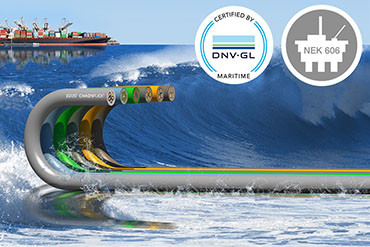Underwater cables are essential for certain applications and the type of cable required will depend on the application. Some cables must meet very special requirements or withstand certain external factors, such as being submerged under water. There are considerations to be thought of when looking at putting cables under water. What problems can arise for cables used in underwater applications? What solutions could we approach for these problems? This blog hopefully will help concrete things you thought you knew about underwater cables and may even identify things you didn’t…… Fiction – igus® cables are perfectly suited to deepwater applications.  Fact – chainflex® cables are not ideal for applications permanently submerged in water hundreds of meters below the oceans surface. However for temporary submersion in the dynamic applications they could be the perfect solution. So, if the chainflex® cables are restricted slightly to certain applications, how do you ensure the cables are waterproof? Cables that are used under water must be able to achieve several different things. Underwater pressure increases with depth and cables used underwater are subjected to this pressure. Therefore, the most important condition is that the cables used can withstand the prevailing pressure. How
do we do that? By giving them a waterproof jacket! The
normally extruded jacket material such as PVC, PUR and TPE, are too porous and
over time, would take on water. This again is down to the pressure. This causes
it not only to swell, but also to become softer, therefore no longer guaranteeing
the cables protection. The result is that water slowly penetrates the cable’s interior. Worst case scenario is that the cable’s insulation could become damaged leading to short circuiting and failure of the entire system. This ingress of moisture through a cable’s outer jacket is called transverse ingress. When transverse ingress occurs, moisture spreads lengthwise within the cable. This is known as the capillary effect. The liquid is continually pressed further through the small gaps and cavities in the cable. To avoid this, we need to waterproof the cable. How is this achieved? A substance, such as non-woven fabric is inserted under the outer jacket. These fabrics swell upon contact with water, preventing moisture from spreading inside the cable. Underwater cable use requires materials that are permanently sealed. A cable’s outer jacket can be sealed by such means as using a rubber mixture. The swelling substances mentioned above are also used under the jacket. Find out more about how igus® chainflex® cables are made here. This type of cable is used in a worldwide network of cables, thus contributing to networking the entire world. However, the maritime industry is one of the most popular industries with underwater cable requirements. igus® Chainflex® cables are designed for continuous operations installed inside energy chain systems. The structure/ materials required for water impervious cables, whist excellent for underwater submersion, are not suitable for this style of operation. Therefore, to achieve our long lasting lifetime in energy chains performance, we can not manufacture to underwater standards. Yes we do! Whilst out cables are not rated for underwater applications we have many examples worldwide where our products are used in this manner. Primarily for temporary immersion applications, both our PUR and TPE jacket materials provide the perfect blend of dynamic performance and temporary water resistance. Companies working in the maritime environment require highly dynamic applications for operations at sea, however this doesn’t mean fully submerged applications. The igus® chainflex® cables are primarily suitable for applications with low or periodic water influence and not for continuous use deep under water. The reason for this, is that we must ensure the materials’ abrasion resistance and we cannot do this with rubber-like outer jackets. If you require a cable to be permanently or temporarily submerged under water, contact our expert. Pure Magnesium Bar,Pure Magnesium Metal,High Purity Magnesium Metal Rod, Pure Magnesium Metal Rod Luoyang Maige Magnesium Industry Co., Ltd , https://www.maigemagnesium.comUnderwater cables: fact or fiction?
Add a waterproof jacket
How does the industry waterproof cables?

What industries need underwater cables?
Why doesn’t igus® do this with chainflex®?
So igus® doesn’t have cables installed in underwater applications ?
 hbspt.cta.load(3055426, '412256bc-f097-4b55-a3e7-ba13028d804b', {});
hbspt.cta.load(3055426, '412256bc-f097-4b55-a3e7-ba13028d804b', {});